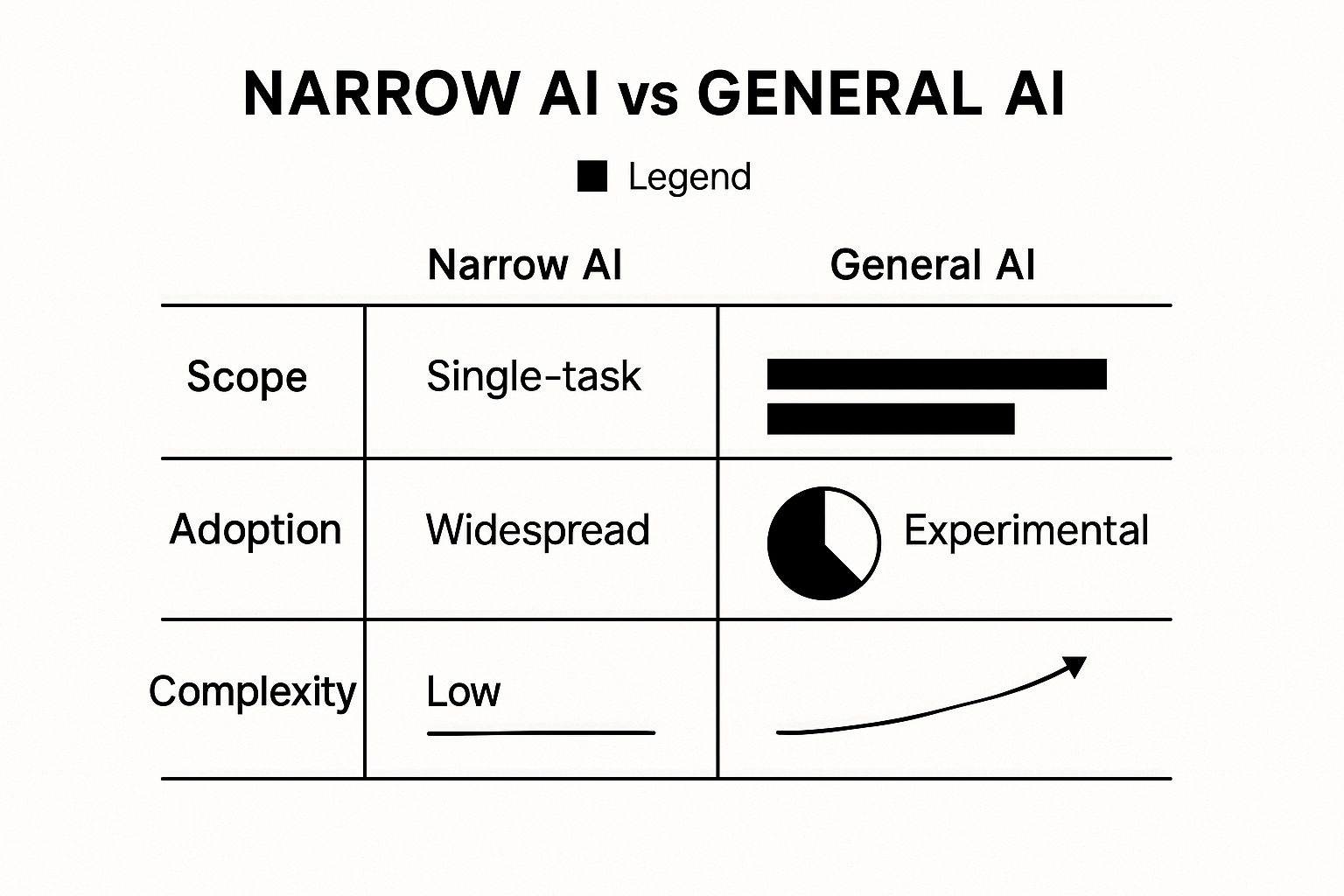Demystifying AI: What You Actually Need to Know

So, you're curious about AI, but feel a little lost in the sea of technical terms and hype? No worries, it's much easier to grasp than you might think! This section breaks down the basics of artificial intelligence for anyone just starting out. We'll explore what AI is, what it isn't, and how it's already woven into your everyday life.
What Is Artificial Intelligence?
At its heart, artificial intelligence is all about creating machines that can handle tasks that normally need human smarts. Think of things like learning, solving problems, and making decisions. But AI isn't about robots taking over the world (at least not yet!). It's about using smart systems to automate repetitive processes, analyze tons of data, and ultimately, help us make better choices. For example, those personalized recommendations you get on Netflix or Spotify? Or the helpful voice assistants on our phones? That's the power of AI at work.
Different Types of AI
AI systems are often grouped by their abilities. Narrow or weak AI is the most common type we see today. It's fantastic at specific tasks, like playing chess or translating languages. However, it can't do anything outside its programmed area of expertise. Then there's General or strong AI. This type is still mostly theoretical. It would have human-level intelligence and be able to learn and perform any intellectual task a human can. And somewhere beyond that lies Super AI, a hypothetical form of AI that would surpass human intelligence in every way.
Understanding these distinctions is key to separating actual AI capabilities from marketing buzzwords. Many products advertised as "AI-powered" simply use complex algorithms, not true artificial intelligence. Knowing the difference helps you navigate the real world of AI.
The Growing Impact of AI
The global AI market is exploding, showing just how important it's becoming across many industries. As of 2025, the AI industry is valued at over $600 billion, and it's projected to grow more than fivefold in the coming years. This growth isn't just about money; it means new job opportunities. An estimated 97 million people are expected to be working in the AI field by 2025. Plus, a whopping 83% of companies are now making AI a priority in their business strategies. This rapid expansion is driven by advances in areas like machine learning and deep learning, which are increasingly integrated into everyday operations across industries. You can dive deeper into the numbers here: https://explodingtopics.com/blog/ai-statistics
Want to learn more? Check out this resource: AI Learning for Beginners. Understanding the core concepts of AI opens doors to a world of exciting possibilities, from boosting your career to developing innovative solutions. It’s the first step on your journey into this fascinating field!
Core AI Technologies You Need to Understand

Exploring the world of AI can seem daunting at first. Don't worry, this section is your friendly guide to the core AI technologies. We'll break down complex topics like machine learning, natural language processing, and computer vision into digestible bits, perfect for beginners.
Machine Learning: Learning From Data
Think of machine learning like teaching a dog a new trick. With repetition, rewards, and corrections, they eventually learn. Machine learning is a type of AI where computers learn from data without specific instructions. We feed the computer tons of information, and it figures out the patterns itself.
For example, a machine learning algorithm can analyze thousands of pictures of cats and dogs. The algorithm learns the key differences between the two animals. Then, it can identify new pictures of cats and dogs it’s never seen before. Pretty cool, right?
Natural Language Processing: Understanding Human Language
Have you ever used a virtual assistant like Siri or Google Translate? That's natural language processing (NLP) at work! NLP helps computers understand, interpret, and even generate human language.
This means computers can read text, listen to speech, figure out what it means, analyze the sentiment, and identify important parts. NLP powers chatbots, translation tools, and even software that analyzes customer reviews.
Computer Vision: Giving Computers Sight
Computer vision gives computers the ability to "see" and understand images and videos, much like our own eyes. This technology allows computers to identify objects, recognize faces, and understand the context of a scene.
Think self-driving cars navigating streets, doctors analyzing medical images, or security systems detecting unusual activity. These are all thanks to the power of computer vision.
To illustrate the projected growth of these technologies, take a look at the data chart below. It shows the predicted market size of Machine Learning, Natural Language Processing, and Computer Vision by 2028.

As the chart shows, Machine Learning is expected to reach $209 billion, followed by Natural Language Processing at $78 billion, and Computer Vision at $47 billion. This impressive growth highlights the increasing significance of these AI sectors.
To help you compare these technologies, let's take a look at a quick breakdown:
Core AI Technologies Comparison A beginner-friendly comparison of major AI technologies and their applications
| Technology | What It Does | Real-World Examples | Difficulty Level for Beginners |
|---|---|---|---|
| Machine Learning | Allows computers to learn from data without explicit programming | Image recognition, spam filtering, fraud detection | Medium |
| Natural Language Processing | Enables computers to understand and process human language | Chatbots, language translation, sentiment analysis | Medium-High |
| Computer Vision | Enables computers to "see" and interpret images and videos | Self-driving cars, medical image analysis, object detection | High |
This table highlights the key differences in what each technology does and provides examples of how they're used. It also gives you a sense of the relative learning curve for each. As you can see, each technology plays a unique and important role in the world of AI. Understanding these core technologies is your first step to exploring this exciting field.
Mapping Your AI Learning Journey: Paths For Real Success

So, you're curious about AI and eager to start learning? Great! This section is your personal guide to success, especially if you're just beginning. Whether your background is in marketing, healthcare, business, or tech, we'll explore personalized learning paths that complement your existing skills.
Choosing The Right Path: A Personalized Approach
Finding the right learning path is a bit like choosing the right hiking trail. You wouldn’t start with the most challenging climb, would you? The same principle applies to learning AI. We'll help you find the perfect starting point.
For Business Professionals: Focus on understanding how AI can tackle business challenges. Explore areas like data analysis, predictive modeling, and AI-powered decision-making.
For Creatives and Marketers: Explore the exciting world of generative AI for tasks like content creation, image generation, and designing personalized marketing campaigns.
For Healthcare Professionals: Discover how AI is revolutionizing healthcare through advancements in medical image analysis, drug discovery, and personalized medicine.
For Tech Enthusiasts: Begin with a beginner-friendly programming language like Python and delve into core concepts such as machine learning algorithms.
Essential Skills And Resources: What Really Matters
The sheer amount of AI information out there can feel overwhelming. This section pinpoints the essential skills and free resources that offer the biggest bang for your buck, so you can make the most of your valuable time.
Programming Languages: Python is often the go-to language for beginners due to its straightforward syntax and rich set of libraries designed specifically for AI development.
Math Concepts: Don't worry, you don't need to be a math whiz! A basic understanding of linear algebra, probability, and statistics is helpful, but not crucial in the early stages. Plenty of free online resources explain these concepts in easy-to-understand language.
Free Resources: Jumpstart your learning with free online courses, tutorials, and vibrant communities like Kaggle where you can gain hands-on experience and connect with other learners.
Overcoming Challenges And Staying Motivated
Learning AI, just like learning any new skill, can have its ups and downs. It's perfectly normal to feel overwhelmed or lose motivation at times. Here's how to navigate those challenges.
Learning Plateaus: Everyone hits a learning plateau at some point, a period where you feel like you're not making progress. Don't get discouraged! Reach out for help, revisit the fundamentals, and take breaks to avoid burnout.
Staying Motivated: Connect with a community of learners, set realistic goals, and celebrate your achievements, no matter how small. Remember, every step forward contributes to your overall growth.
The AI educational landscape is constantly evolving, especially in developed countries. For example, in the U.S., there's been a 22% increase in the number of computing bachelor's degrees awarded over the past ten years. This growth is vital for future innovation, but access to these opportunities isn’t evenly distributed globally, with regions like Africa facing significant limitations. You can explore more detailed statistics here. By following a structured approach, utilizing the right resources, and maintaining your motivation, you can successfully begin your AI journey and unlock the tremendous potential of this exciting field.
Building Your First AI Projects: From Concept to Reality

So, you're ready to dive into the exciting world of AI? Great! Making the leap from theory to practice is key, and this section will guide you through some beginner-friendly projects that deliver real results, even without tons of technical experience. We'll explore how to take your first AI projects from initial idea to a working application.
Starting Small: Beginner AI Project Ideas
Choosing the right project is crucial when you're just starting out. It's always best to pick something that interests you and isn't overly complicated. This way, you can build confidence and see tangible results quickly.
- Simple Recommendation System: Imagine building a system that suggests movies based on someone's viewing history. This project introduces you to the principles behind recommendation engines, a very common application of AI.
- Basic Image Classifier: How about creating a program that can tell the difference between images of cats and dogs? This helps you understand the basics of computer vision.
- Text Analysis Tool: You could also develop a tool that analyzes text for sentiment (positive, negative, or neutral). This project dives into the fundamentals of natural language processing.
The best part? These projects are designed to grow with you. As your skills improve, you can add more features and refine their capabilities. This creates a continuous learning process and keeps things interesting.
Step-By-Step Guidance and Support
We know that starting something new can be frustrating. That’s why we've designed these projects with beginners in mind:
- Step-by-step instructions: Clear, easy-to-follow guidance will keep you on track.
- Conceptual explanations: We'll explain the underlying concepts in simple terms, so you really understand what you're building.
- Customization options: Make each project your own! Adapting the projects to your interests makes the learning process more engaging and personal.
- Troubleshooting tips: We'll point out common issues beginners run into and offer solutions to get you back on track.
Choosing The Right Tools
Easy-to-use tools are essential, especially when you're learning. Luckily, there are lots of platforms out there made specifically for AI newcomers, offering:
- No-code/low-code environments: These platforms allow you to experiment with AI without needing to write complicated code.
- User-friendly interfaces: Intuitive interfaces make it a breeze to build and test AI models.
- Extensive documentation and tutorials: There are tons of resources available to guide you through the process.
This focus on user-friendliness makes learning AI smoother and more enjoyable, so you can concentrate on grasping the core concepts.
To help you get started, here's a handy table summarizing some project ideas:
Beginner AI Project Ideas
The following table offers a snapshot of potential projects, required skills, estimated time commitment, and the tools you'll need.
| Project | Skills Required | Time Commitment | Tools Needed | Learning Outcome |
|---|---|---|---|---|
| Movie Recommendation System | Basic Python, Data Manipulation | Weekend project | Python libraries (Pandas, Scikit-learn) | Understanding recommendation algorithms |
| Image Classifier | Basic Python, Image Processing | 1-2 weeks | Python libraries (TensorFlow / Keras, OpenCV) | Introduction to computer vision |
| Text Sentiment Analyzer | Basic Python, Text Processing | 1 week | Python libraries (NLTK, SpaCy) | Fundamentals of natural language processing |
This overview should help you pick a project that fits your current skills and the time you have available. Remember, the goal is to have fun while building something real. That’s the key to making learning both effective and enjoyable. These projects are just the beginning of your AI journey, laying a solid foundation for you to build upon as you progress.
Essential AI Tools That Won't Overwhelm Beginners
Transitioning from theory to practice is a crucial step in learning about AI, especially for beginners. This means getting hands-on experience with the right tools and platforms. Thankfully, plenty of resources are designed with beginners in mind. This section explores essential, accessible, and user-friendly AI tools that won't leave you feeling lost.
No-Code and Low-Code Platforms: Diving in Without the Code
Many beginners believe extensive coding skills are required to work with AI. However, no-code and low-code platforms are changing this perception. These tools offer visual, drag-and-drop interfaces for building AI models. This allows you to focus on the underlying AI concepts, not complex code. For example, Teachable Machine by Google lets you create image classifiers without any coding. This practical approach is perfect for exploring core AI concepts.
User-Friendly Data Visualization Tools: Making Sense of the Data
AI often involves working with large datasets. Data visualization tools provide intuitive ways to explore, analyze, and present this data clearly. Tools like Google Data Studio (now Looker Studio) and Tableau Public offer powerful features through easy-to-use interfaces, making data visualization accessible to everyone. These tools help you understand data trends, identify patterns, and communicate your AI insights effectively.
AI-Powered Applications: Exploring Real-World Implementations
A great way to understand AI is by exploring real-world applications after grasping the core concepts. You can jumpstart your AI journey by checking out projects like AI Generated Coloring Pages For Kids. This offers a tangible understanding of AI's practical uses.
Choosing the Right Tools: A Practical Guide
With so many AI tools available, choosing the right one can feel daunting. Consider the learning curve, available tutorials, and cost when making your decision. Many platforms have free versions, perfect for initial learning and experimentation. For a curated list, check out our guide on 10 No-Code AI Tools to Boost Your Workflow in 2025. Also, think about the long-term potential of each tool. Choosing platforms with pathways to more advanced features ensures your initial learning continues to benefit you as your skills grow.
The Impact of AI: A Broader Perspective
AI's growing adoption isn't just impacting individual projects; it's changing the global economy. By 2030, AI is expected to contribute $15.7 trillion to global GDP, a 26% increase. This highlights AI's potential to transform industries. In business, 48% of companies use AI to leverage big data, and generative AI is also on the rise, with 65% of its users being Gen Z or Millennials. You can find more statistics here. This wider context emphasizes the importance of understanding AI, particularly for those just beginning their AI journey.
Navigating AI Ethics: Critical Awareness for Beginners
Building your first AI projects is an exciting journey! But as you dive into the world of artificial intelligence, it's essential to consider the ethical implications of your work. This section explores responsible AI development, highlighting potential issues and emphasizing why ethical considerations are so important, especially for those just starting out.
Recognizing Ethical Challenges in AI
AI systems, in and of themselves, aren't biased. However, they can unfortunately reflect and even amplify existing biases found within the data they are trained on. This can result in unfair or discriminatory outcomes. For instance, imagine an AI system used for hiring. If the training data reflects historical biases, the system might inadvertently discriminate against certain groups.
Another key concern with AI systems is privacy. AI often relies on huge amounts of data, and the misuse or unauthorized access to this data can have serious repercussions. Understanding data privacy and security is therefore paramount for anyone involved in AI development.
Finally, we need to think about the societal impacts of AI. As AI becomes more interwoven into our lives, it has the potential to displace jobs and exacerbate existing social inequalities. Considering the broader societal impact of AI and striving for solutions that benefit everyone is crucial for responsible development.
Real-World Case Studies: Learning From Mistakes
Instead of getting bogged down in abstract theories, let's look at real-world examples where AI projects, despite good intentions, ran into ethical roadblocks. Analyzing these cases offers valuable lessons for developing AI responsibly.
- Bias in Facial Recognition: Some facial recognition systems have unfortunately demonstrated higher error rates for certain demographic groups. This highlights the absolute necessity of diverse and representative training data.
- Privacy Violations in Data Collection: Instances of data breaches and misuse underscore the inherent risks associated with collecting and storing sensitive personal information. Robust data security measures are not optional; they're a must.
- Job Displacement due to Automation: AI-driven automation can unfortunately lead to job losses in specific sectors. This points to the urgent need for strategies to help people adapt to a changing job market and acquire new skills.
These case studies provide practical lessons, reminding us that ethical considerations are not just theoretical discussions; they are essential requirements for responsible AI development. For more insights into AI's influence, check out this article: Top 10 Ways AI is Changing the Creative Industries.
Practical Lessons for Responsible AI Use
Developing ethical awareness means understanding potential risks and incorporating ethical considerations into every single stage of AI development. Here are some key takeaways for beginners:
- Data Diversity: Ensure your training data is diverse and representative to minimize bias.
- Privacy Protection: Implement robust data security measures to safeguard user information.
- Transparency and Explainability: Strive to create AI systems that are transparent and easy to understand, allowing users to see how decisions are made.
- Human Oversight: Maintain human oversight of your AI systems to ensure accountability and prevent unintended consequences.
- Continuous Evaluation: Regularly evaluate your AI systems for bias and other ethical concerns.
Developing Critical Thinking Skills
As you embark on your AI journey, honing your critical thinking skills is essential. This involves asking questions, evaluating claims, and approaching AI solutions with a healthy dose of skepticism. Don't just accept claims about AI at face value. Instead, ask yourself:
- What data was used to train this AI?
- Could this AI be biased in any way?
- What are the potential privacy implications of using this AI?
- What are the broader social consequences of implementing this AI?
By developing these critical thinking skills, you can contribute to the responsible development and use of AI. This balanced approach will allow you to appreciate the incredible power of AI while maintaining a strong ethical compass throughout your learning journey. This sets you up for success, not only as an AI developer, but as a responsible and valuable member of the AI community. Remember, ethical considerations are not just an afterthought; they're a fundamental aspect of responsible AI development.
Beyond The Basics: Elevating Your AI Expertise
Transitioning from an AI novice to a more seasoned practitioner takes a focused approach. This section maps out a path for your continued growth, drawing on insights from AI professionals who've successfully made this journey. We'll explore specialized learning, portfolio building, and networking strategies to help you advance your AI expertise.
Identifying Your Niche: Specialization Within AI
Like any field, AI has a diverse range of specializations. Focusing on a specific area lets you develop deeper expertise and become a highly sought-after professional. For instance, if you're fascinated by language, Natural Language Processing (NLP) might be a great fit. Enjoy working with visuals? Computer Vision could be more your style. Other promising areas include Machine Learning, Robotics, and AI Ethics. Choosing a specialization that genuinely interests you is key for long-term motivation and success. This focus helps you tailor your learning and build targeted projects for your portfolio.
Advanced Learning Options: Expanding Your Skillset
Once you've identified your area of interest, check out advanced learning opportunities that match your goals and what you can manage. These options range from specialized online courses and intensive bootcamps to full degree programs. Online courses are flexible and can be a budget-friendly way to acquire specific skills. Bootcamps provide immersive, hands-on training, perfect for quickly gaining practical experience. Degree programs offer a more comprehensive education, ideal for those wanting in-depth theoretical knowledge and research opportunities. Weigh the pros and cons of each option, considering factors like time commitment, cost, and the level of support you'll receive.
Building a Portfolio: Showcasing Your Skills
A solid portfolio is essential in AI. It shows off your practical skills and provides concrete proof of what you can do. Starting out, concentrate on projects that demonstrate your grasp of fundamental AI concepts. You could build a simple recommendation system, develop a basic image classifier, or create a text analysis tool. As you improve, tackle more complex projects that reflect your chosen specialization. Contributing to open-source projects is another excellent way to build your portfolio and get valuable real-world experience. A well-curated portfolio not only demonstrates your technical abilities, but also your creativity and problem-solving skills.
Connecting With The AI Community: Networking and Mentorship
Engaging with the AI community can seriously boost your learning and career growth. Attend conferences, join online forums, and participate in local meetups to connect with others in the field. Networking lets you learn from experienced professionals, discover new trends, and explore potential career paths. Finding a mentor can be incredibly helpful. A mentor provides guidance, support, and insights based on their experience. Mentorship creates a personalized learning experience and helps you navigate the challenges of a career in AI. Actively participating in the AI community opens doors to collaboration, mentorship, and tons of valuable learning opportunities.
To jumpstart your AI journey and connect with a vibrant community, consider joining VibeMakers at https://vibemakers.ai. VibeMakers offers a platform for non-technical AI enthusiasts, hobbyists, and experienced professionals to learn, collaborate, and grow their careers in the dynamic field of artificial intelligence. With access to exclusive workshops, job opportunities, premium resources, and a supportive community, VibeMakers empowers you to turn your AI passion into a successful career.
Article created using Outrank